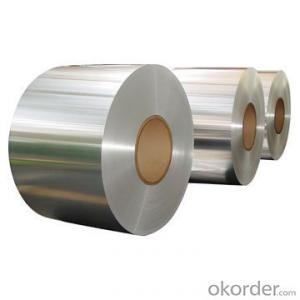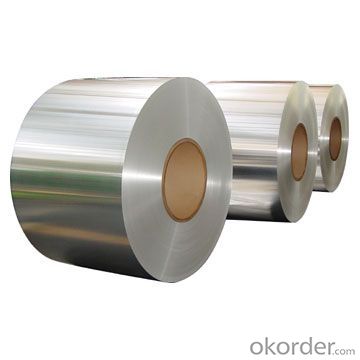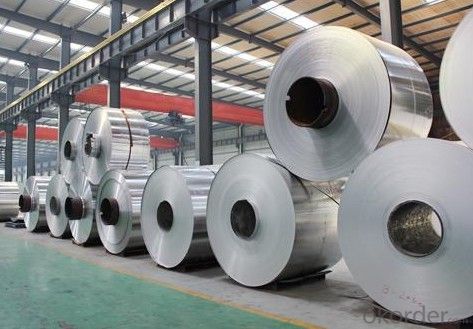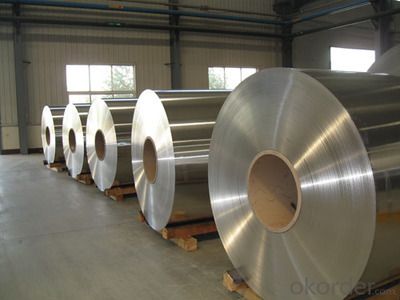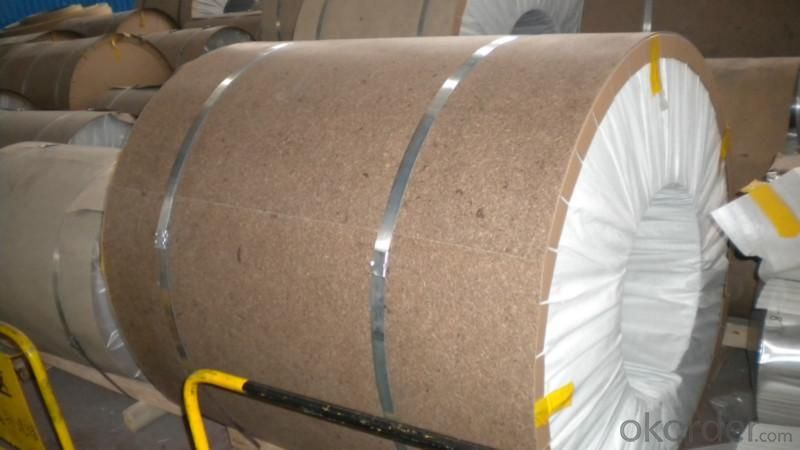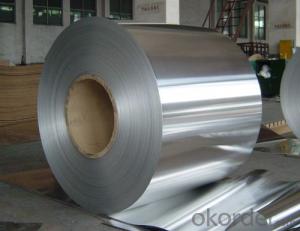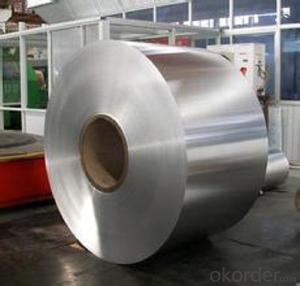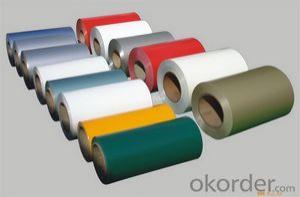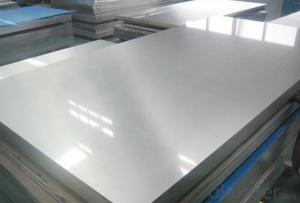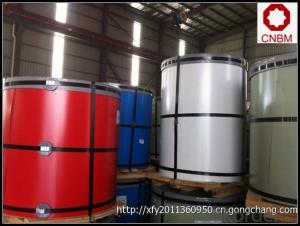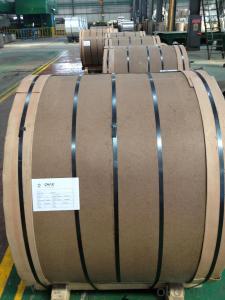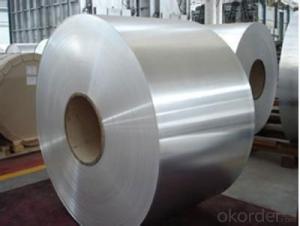Coil Coated Aluminum Sheet - China Manufacturer Price 3003/8011 Aluminum Coils for Cookware
- Loading Port:
- Shanghai
- Payment Terms:
- TT OR LC
- Min Order Qty:
- 7 m.t.
- Supply Capability:
- 10000 m.t./month
OKorder Service Pledge
OKorder Financial Service
You Might Also Like
Specification
Product Description & Specifications
Aluminium Coils
1.Alloy: 3003, 8011
2.Temper: O,H14H16,H18,H24 etc.
3.Thickness:0.2-15mm
4.Width: 2300mm max
5.Standards:ASTM-B209. EN573-1, GB/T3880.1-2006
Packing : Export wooden pallets
Quality of material: totally free from defects like white rust, oil patches, roll marks, edge damage, camber, dents, holes, break lines, scratches and free from coil set
Application : Mainly used insigns, billboards, building exterior decoration, bus body, high-rise buildings and factories wall decoration, kitchen sink, lamp, fan leaves, with pieces of electronic, chemical equipment, sheet metal processing parts, deep drawing or spinning hollowware, welding parts, heat exchangers, bell surface and disk, plate, kitchenware, decorations, reflective devices, ect
- Q: Can aluminum coils be used for architectural applications?
- Aluminum coils are indeed applicable for architectural purposes. With its versatility and lightweight nature, aluminum is an ideal material that boasts exceptional resistance against corrosion, making it suitable for numerous architectural applications. Exterior cladding, roofing, facades, and even interior uses like ceilings and wall panels can all benefit from the utilization of aluminum coils. These coils are easily malleable, cuttable, and moldable, allowing for flexibility in design and innovative architectural solutions. Moreover, aluminum coils can be coated with diverse finishes, such as paint or anodized coatings, to enhance both aesthetics and durability. All in all, due to their adaptability, durability, and aesthetic charm, aluminum coils are highly favored within the architectural industry.
- Q: Can aluminum coils be used in low-friction applications?
- Yes, aluminum coils can be used in low-friction applications. Aluminum's low coefficient of friction and excellent thermal conductivity make it a suitable material for various applications where low friction is desired, such as in sliding mechanisms, bearings, and electrical connectors.
- Q: How do aluminum coils contribute to sustainable energy systems?
- There are several reasons why aluminum coils are crucial in sustainable energy systems. Firstly, aluminum is a lightweight metal that conducts electricity well, making it ideal for producing coils used in renewable energy technologies like wind turbines, solar panels, and electric vehicles. By using aluminum coils, these systems become more efficient and perform better due to the reduced weight. Secondly, aluminum is abundant in nature and can be recycled multiple times without losing its original properties. This results in significant energy savings and less environmental impact. By using aluminum coils, sustainable energy systems can reduce their reliance on new materials and support a circular economy. Furthermore, aluminum coils are resistant to corrosion and have excellent heat transfer properties. This makes them highly durable and capable of withstanding harsh weather conditions, ensuring the longevity and reliability of renewable energy systems. The durability of aluminum coils also reduces the need for frequent maintenance or replacements, minimizing waste generation and conserving resources. Moreover, aluminum is a non-toxic material that poses minimal risks to human health and the environment. Unlike other metals, aluminum does not release harmful substances into the soil or water. This makes it a safe choice for sustainable energy systems. Lastly, the use of aluminum coils in sustainable energy systems helps to reduce greenhouse gas emissions. Due to its lightweight nature, aluminum requires less energy for transportation and installation, thereby reducing the carbon footprint associated with manufacturing and installation processes. Additionally, the increased efficiency and performance of renewable energy systems using aluminum coils contribute to the displacement of fossil fuel-based energy generation, leading to a decrease in overall carbon emissions. In conclusion, aluminum coils play a significant role in sustainable energy systems by improving the efficiency, durability, recyclability, and environmental friendliness of renewable energy technologies. Their lightweight nature, resistance to corrosion, and excellent heat transfer properties make them suitable for various applications. Additionally, their abundance and recyclability support resource conservation and a circular economy. By using aluminum coils, sustainable energy systems can reduce their environmental impact, enhance performance, and contribute to a cleaner and more sustainable future.
- Q: Are there any limitations on the bending or shaping of aluminum coils?
- Yes, there are limitations on the bending or shaping of aluminum coils. Aluminum has a certain level of elasticity and ductility, which allows it to be bent or shaped to a certain extent. However, excessive bending or shaping can lead to cracking, deformation, or even breakage of the aluminum coils. Additionally, the thickness and temper of the aluminum coils can also affect their ability to be bent or shaped. Therefore, it is important to consider these limitations when working with aluminum coils to ensure their structural integrity is maintained.
- Q: How do aluminum coils contribute to the sound insulation of buildings?
- Aluminum coils contribute to the sound insulation of buildings by acting as a barrier or shield against sound transmission. The coils are often used in the construction of windows, doors, and other building components to dampen or block noise from entering or exiting a space. Their properties, such as their density and ability to reflect or absorb sound waves, help reduce the level of noise that can pass through the building envelope, resulting in improved sound insulation.
- Q: Can aluminum coils be used in kitchen appliances?
- Kitchen appliances can indeed utilize aluminum coils. Due to its remarkable thermal conductivity and resistance to corrosion, aluminum is extensively employed in the production of kitchen appliances. It finds frequent application in refrigerators, air conditioners, and other devices that necessitate efficient heat transfer. Lightweight and enduring, aluminum coils effectively disperse heat, rendering them ideal for a wide array of kitchen appliances.
- Q: What are the different coil lengths available for aluminum coils?
- Aluminum coils come in a variety of lengths, depending on the specific application and requirements. Typically, these lengths range from a few feet to several hundred feet. The most commonly used coil lengths in industries like HVAC, automotive, and construction are 50 feet, 100 feet, and 250 feet. However, it is worth mentioning that custom coil lengths can also be produced to meet the customer's specific needs. These custom lengths may vary depending on factors such as coil thickness, width, and intended use. Ultimately, the available coil lengths for aluminum coils are adaptable and can be customized to meet the demands of various industries and applications.
- Q: How are aluminum coils used in the production of heat sinks?
- Aluminum coils are used in the production of heat sinks by being shaped into fins, which are then attached to a base plate. This finned structure allows for increased surface area, facilitating better heat dissipation from the electronic components. The coils are typically formed through a process called extrusion, enabling them to efficiently transfer and dissipate heat, making them an essential component in heat sink manufacturing.
- Q: What are the typical lead times for aluminum coil orders?
- The typical lead times for aluminum coil orders can vary depending on the supplier and their current production capacity. However, it is common to expect lead times ranging from a few weeks to a couple of months for standard aluminum coil orders. It is advisable to contact the specific supplier for more accurate and up-to-date lead time information.
- Q: Are aluminum coils suitable for beverage can manufacturing?
- Yes, aluminum coils are suitable for beverage can manufacturing.
Send your message to us
Coil Coated Aluminum Sheet - China Manufacturer Price 3003/8011 Aluminum Coils for Cookware
- Loading Port:
- Shanghai
- Payment Terms:
- TT OR LC
- Min Order Qty:
- 7 m.t.
- Supply Capability:
- 10000 m.t./month
OKorder Service Pledge
OKorder Financial Service
Similar products
Hot products
Hot Searches
Related keywords
